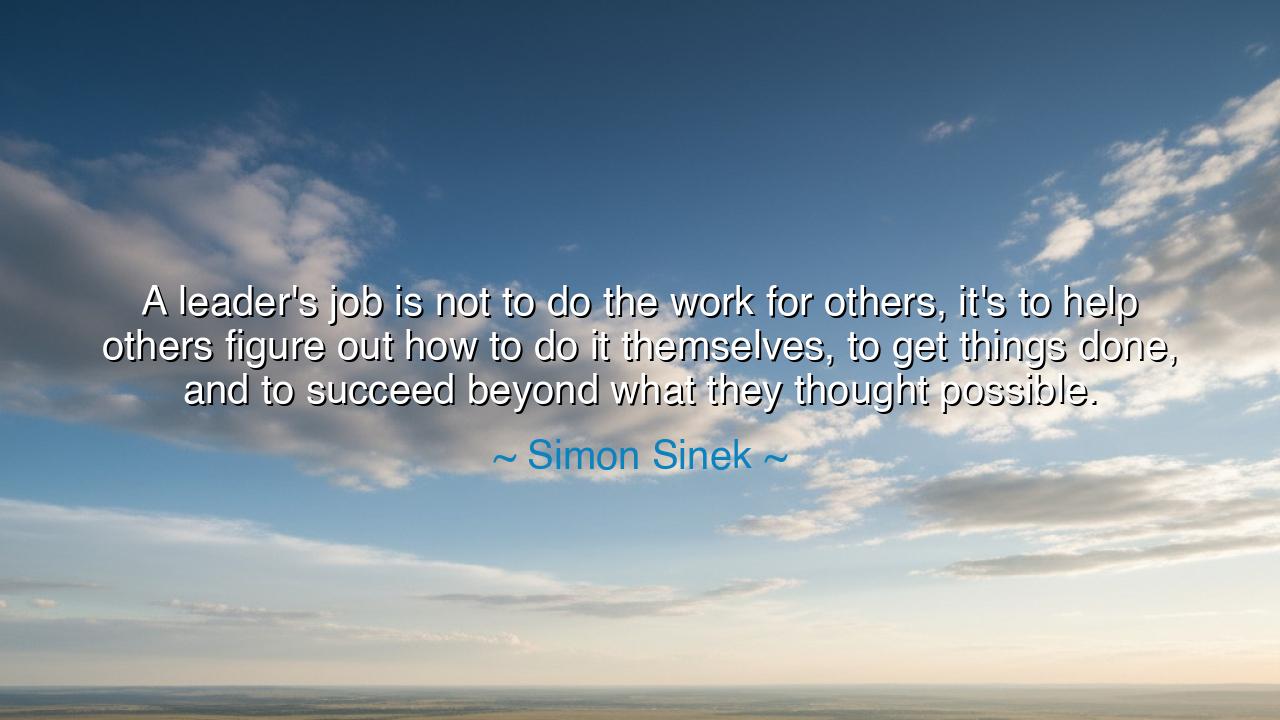
A leader's job is not to do the work for others, it's to help
A leader's job is not to do the work for others, it's to help others figure out how to do it themselves, to get things done, and to succeed beyond what they thought possible.






The words of Simon Sinek—“A leader’s job is not to do the work for others, it’s to help others figure out how to do it themselves, to get things done, and to succeed beyond what they thought possible”—echo with the eternal truth of stewardship. They remind us that true greatness in leadership lies not in carrying all burdens alone, but in awakening the strength of others. The mark of a true leader is not the height of his own achievements, but the rise of those who walk beside him.
The ancients knew this truth well. The wise king was not he who conquered nations by his own sword, but he who inspired his warriors to fight with courage, his citizens to build with pride, his people to dream with hope. The general who sought to win every battle himself perished quickly; the one who trained his soldiers to become more than they believed they could be ensured victory for generations. Such is the essence of leadership: to plant seeds that grow into forests of greatness.
Sinek’s words also unveil a deeper truth: that the work of a leader is not only practical, but spiritual. To guide another is to give them confidence, to unlock their hidden strength, to show them that their limits were illusions. In this way, the leader is both mentor and mirror, reflecting the greatness within others until they see it for themselves.
This is also an act of humility. The false ruler clings to glory, seeking all credit for himself. But the true leader rejoices when others surpass him, for his purpose was never to hoard honor, but to multiply it. The ancients called this legacy: when the master departs, the disciples continue the work, stronger than before, and the vision endures.
So let this teaching be remembered: the path of a leader is not to shine alone, but to kindle flames in others until the night itself is ablaze. Do not carry all burdens; instead, lift the hands of those beside you. For the greatest leaders are not remembered for what they alone accomplished, but for what they inspired countless others to succeed in achieving, far beyond what they once thought possible.






UGUser Google
Simon Sinek’s approach to leadership is about teaching and guiding, not just directing. It made me think about how often leaders step in when they should step back. How do we create a culture where people are encouraged to push their own limits, instead of relying on the leader to do it for them? What are some practical ways to empower others to succeed on their own?
QNQuynh Nhu
What I love about Simon Sinek’s view on leadership is how it focuses on growth, not just productivity. A leader who empowers their team to succeed beyond what they thought possible is truly rare. But what happens when a leader’s guidance isn’t enough? How can a leader adapt if their team is struggling to reach those higher goals?
MTNguyen Minh Thu
Simon Sinek’s quote makes me think about how true leadership isn’t about being the hero who saves the day, but about inspiring others to rise to challenges on their own. But is it possible for someone to be a good leader without being deeply involved in every decision? Where’s the line between giving autonomy and making sure the team doesn’t fall into chaos?
CLdo cha lo
I really resonate with Simon Sinek’s view on leadership. It’s about fostering independence and growth in others, which in turn builds stronger teams. But can leaders be too hands-off sometimes? How do we ensure that we provide enough support without overstepping and taking away the opportunity for growth and self-sufficiency?
TLThu Thuy Le
This perspective from Simon Sinek on leadership is so refreshing. It’s not about doing the work for others, but rather enabling them to figure it out on their own. Does this mean that a great leader should constantly step back, allowing others to succeed and fail on their own? How do leaders avoid micromanaging while still offering the right amount of support and guidance?